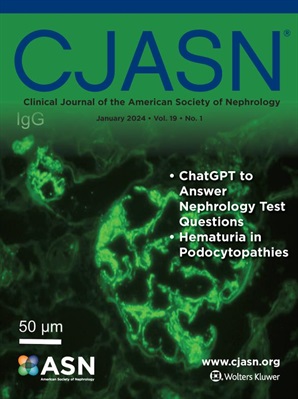胰高血糖素样肽-1 受体激动剂对肾脏预后的影响:随机安慰剂对照试验的元分析
IF 8.5
1区 医学
Q1 UROLOGY & NEPHROLOGY
Clinical Journal of the American Society of Nephrology
Pub Date : 2024-10-08
DOI:10.2215/cjn.0000000584
引用次数: 0
摘要
不同的人群。方法:我们对随机对照试验进行了一项荟萃分析,这些试验对患有或未患有慢性肾脏病的 2 型糖尿病 (T2D) 或超重/肥胖患者进行了 GLP-1 RA 治疗与安慰剂对比试验,并将肾脏事件作为主要或次要终点进行了报告。主要结果是肾功能恶化,根据各研究报告,肾功能恶化定义为血清肌酐翻倍或估计肾小球滤过率(eGFR)下降≥40%或≥50%。次要结果包括出现持续性白蛋白尿和肾功能恶化或出现持续性白蛋白尿的复合结果。按 eGFR 和白蛋白尿类别进行了分组分析。结果以风险比 (RR) 和 95% 置信区间 (CI) 表示。结果:八项试验符合条件,共纳入 68572 名患者,其中 34042 人(49.6%)接受了 GLP-1 RA 治疗。在随访期间,有1028名接受GLP-1 RA治疗的患者(3.0%)和1150名接受安慰剂治疗的患者(3.5%)出现肾功能恶化。使用 GLP-1 RA(与安慰剂相比)治疗可降低肾功能恶化的风险(RR,0.84;95%CI,0.77-0.91;p<0.001)。此外,使用 GLP-1 RA 治疗还能显著降低出现持续性大蛋白尿的风险以及肾功能恶化或出现持续性大蛋白尿的综合结果的风险。这些结果在患有和未患有慢性肾脏病的患者中一致。结论总之,我们的荟萃分析表明,无论是否患有慢性肾脏病,GLP-1 RA 都能减少 T2D 或超重/肥胖患者的肾脏疾病进展。版权所有 © 2024 年美国肾脏病学会...本文章由计算机程序翻译,如有差异,请以英文原文为准。
The Impact of Glucagon-like Peptide-1 Receptor Agonists on Kidney Outcomes: A Meta-Analysis of Randomized Placebo-Controlled Trials
ferent populations. Methods: We conducted a meta-analysis of randomized controlled trials that tested GLP-1 RA treatment vs. placebo in individuals with type 2 diabetes (T2D) or with overweight/obesity status, with or without CKD, with kidney events reported as primary or secondary endpoints. The primary outcome was the occurrence of worsening kidney function, defined as either a doubling of serum creatinine or a ≥40% or ≥50% decline in estimated glomerular filtration rate (eGFR), according to each study report. Secondary outcomes included development of persistent macroalbuminuria and a composite of worsening kidney function or the development of persistent macroalbuminuria. Subgroup analyses were performed by eGFR and albuminuria categories. The results are presented as risk ratios (RR) with 95% confidence intervals (CI). Results: Eight trials were eligible, including a total of 68,572 patients, of which 34,042 (49.6%) received GLP-1 RA treatment. During follow-up, 1,028 participants receiving GLP-1 RA (3.0%) and 1,150 participants receiving placebo (3.5%) experienced worsening kidney function. Treatment with GLP-1 RA (vs placebo) resulted in a reduction in the risk of worsening kidney function (RR, 0.84; 95%CI, 0.77-0.91; p<0.001). Additionally, treatment with GLP-1 RA significantly reduced the risk of developing persistent macroalbuminuria and the risk of the composite outcome of worsening kidney function or development of persistent macroalbuminuria. The results were consistent in patients with and without CKD. Conclusions: In conclusion, our meta-analysis suggests that GLP-1 RA reduce kidney disease progression in T2D or overweight/obesity regardless of CKD status. Copyright © 2024 by the American Society of Nephrology...
求助全文
通过发布文献求助,成功后即可免费获取论文全文。
去求助
来源期刊
CiteScore
12.20
自引率
3.10%
发文量
514
审稿时长
3-6 weeks
期刊介绍:
The Clinical Journal of the American Society of Nephrology strives to establish itself as the foremost authority in communicating and influencing advances in clinical nephrology by (1) swiftly and effectively disseminating pivotal developments in clinical and translational research in nephrology, encompassing innovations in research methods and care delivery; (2) providing context for these advances in relation to future research directions and patient care; and (3) becoming a key voice on issues with potential implications for the clinical practice of nephrology, particularly within the United States. Original manuscript topics cover a range of areas, including Acid/Base and Electrolyte Disorders, Acute Kidney Injury and ICU Nephrology, Chronic Kidney Disease, Clinical Nephrology, Cystic Kidney Disease, Diabetes and the Kidney, Genetics, Geriatric and Palliative Nephrology, Glomerular and Tubulointerstitial Diseases, Hypertension, Maintenance Dialysis, Mineral Metabolism, Nephrolithiasis, and Transplantation.

 求助内容:
求助内容: 应助结果提醒方式:
应助结果提醒方式:


